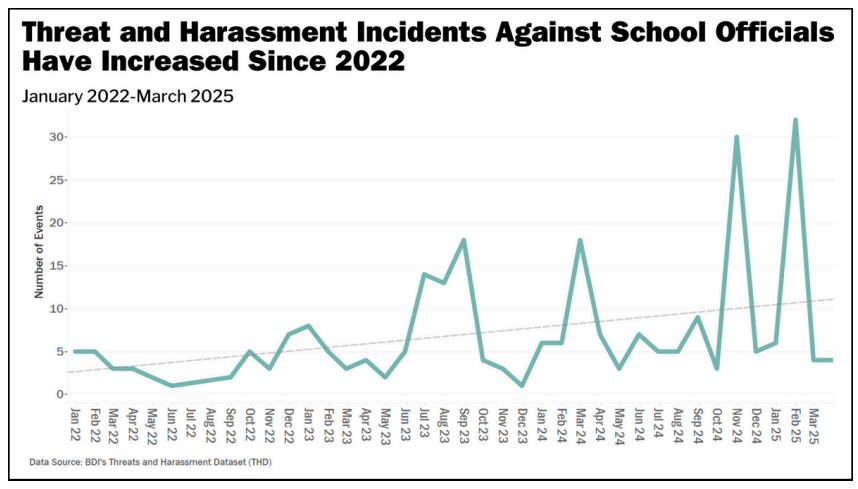Threats against school officials, which rose sharply in the wake of the COVID outbreak, have jumped even higher since President Donald Trump’s re-election in 2024, new data from Princeton University shows.
Threats are increasing as the Trump administration moves to shut down the Department of Education and stifle diversity, equity and inclusion initiatives in K12 and higher education, noted the analysis by the university’s Bridging Divides Initiative.
The Department of Education has also launched a wave of civil rights investigations, mostly targeting the participation of transgender athletes in women’s sports and restrictions on Native American mascots.
Officials face “insults, harassment, threats, or physical attacks,” the report warns.
“The data reveal that school board officials across the country are facing high levels of hostility—including threats that spill over into their personal and family lives—undermining their ability to govern effectively and safely,” says the report, which features a survey of more than 820 school board members and dozens of more in-depth interviews.
“Yet even at a time of heightened risk,” the report notes, “officials remain deeply committed to serving their students and their communities, and many have developed effective frameworks to push back on hostility.”

The survey found that board members worry the hostility will spill over into the school climate and harm students. Women, minorities and younger school board officials reported higher rates of threats and anxiety, which in turn, can “reduce engagement in key activities, such as working on controversial topics or running for re-election.”
Threats and hostility surge when various groups or individuals inject national politics into local district affairs, the report concluded. Board members, for example, blamed anti-LGBTQ groups for thrusting local issues into the national spotlight, often using social media to stir further controversy.
“Officials stress the importance of transparency, professionalism, and collaboration to mitigate the impacts of hostility, but point to insufficient training, outdated policies, and limited law enforcement support as current barriers,” the report adds.
3 ways to confront threats against school officials
Local and state leaders, administrators, school boards and law enforcement can take several steps to reduce risk, strengthen support systems and better prepare board members to contend with threats. The study recommends that officials:
- Provide safety and de-escalation training for school board officials. These resources should be proactive, formalized and tailored to local contexts.
- Create training programs that guide law enforcement and local government officials to identify and mitigate threats and harassment.
- Support trusted leaders and board colleagues to engage in proactive, unified communication with constituents.



